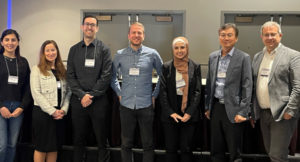Researchers from IDOS’ Programme Inter- and Transnational Cooperation contributed to this year’s edition through presentations and as panellists. Their contributions focussed on the intersection of (geo)politics and development (cooperation).

Copyright: ISA
From 3 to 6 April, the annual convention of the International Studies Association took place in San Francisco. As one of the key academic events in the field of international relations and global politics, ISA conventions bring together several thousands of (junior and senior) scholars to present and discuss latest international studies research. Prof. Stephan Klingebiel presented a paper on “The origins and aging of ODA”, co-authored with Dr Gerardo Bracho, Dr André de Mello e Souza and Dr Paulo Esteves. The paper examines the trajectory of Official Development Assistance since the 1960s, highlights major challenges, and discusses attempts to find alternative metrics for measuring development cooperation.
Dr Sebastian Haug, in turn, presented a paper on relations between the United Nations and China’s Belt and Road Initiative. His paper shows how UN-BRI relations first expanded through attempts on both sides to jointly increase their legitimacy but then all disappeared when faced with Western opposition.
In a panel on “Security and power: discussing the politics of foreign aid” chaired by Sebastian Haug, Stephan Klingebiel presented a draft paper on “The new geopolitics of foreign aid”. Building on recently published work, including an IDOS policy brief, this paper discusses the increasingly complex context of global cooperation and the expanding role of different actors across the Global South. Overall, discussions at the ISA convention underlined not only the shifting geopolitical landscape but also shifts and tensions in the production of knowledge itself, with references to the wars in Gaza and Ukraine as well as the decolonizing agenda figuring prominently across panels.
Schreibe einen Kommentar